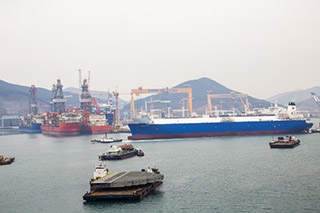(Bloomberg) — The first exports of U.S. shale gas are already helping to prevent prices for the fuel from revisiting a 17-year low.
Cheniere Energy Inc.’s Sabine Pass terminal in Louisiana has received almost 35.4 billion cu. ft. of natural gas since pipeline deliveries to the facility were first reported on Oct. 23, with most of that volume arriving in the last six weeks. Gas futures have climbed 7% over the past month as the shipments limit the size of the biggest seasonal supply glut in four years.
Exports of liquefied natural gas are providing a lifeline for bullish traders after a flood of production from shale formations filled storage caverns, sending futures tumbling to levels not seen since the 1990s. Hedge funds are betting on rising gas prices for the first time since 2014 as cargoes from Sabine Pass boost demand.
“There are actually molecules being taken out of the system; that’s supportive,” said Kyle Cooper, director of research with IAF Advisors and Cypress Energy Capital Management in Houston. “Had Cheniere not been able to begin, it would have been a bearish factor for sure.”
Natural gas futures have rebounded 26% since dropping to $1.611 per million British thermal units early last month, the lowest intraday price since August 1998. Gas for May delivery rose 5% to $2.037 at 12:24 p.m. on the New York Mercantile Exchange.
Cheniere’s gas demand so far this year has helped support prices by 5 to 10 cents per million Btu, said Cooper. While volumes are still relatively small, by this time in 2017, Sabine Pass’s total consumption will reach 200 billion cu. ft. or more, he said.
On April 15, the Creole Spirit departed Sabine Pass, making it the sixth tanker hauling gas from the the terminal in six weeks, vessel tracking data compiled by Bloomberg show. Two more are scheduled to arrive by the end of this month, according to the Sabine Pilots.
And more export help is on the way. Cheniere expects to finish commissioning the first plant, known as Train 1, at the Louisiana terminal by the end of this month and begin the startup process for Train 2 in August, Meg Gentle, president of marketing for the company, said in the LNG 18 conference in Perth April 13. Royal Dutch Shell Plc’s BG Group Plc is contracted to receive volumes once Train 1 is completed, according to company filings.
Looking at the number of ships that have departed Sabine Pass, “I was actually surprised to see there is some relative strength in that area,” said Bob Yawger, director of the futures division at Mizuho Securities USA Inc. in New York. “The customer base is increasing.”




